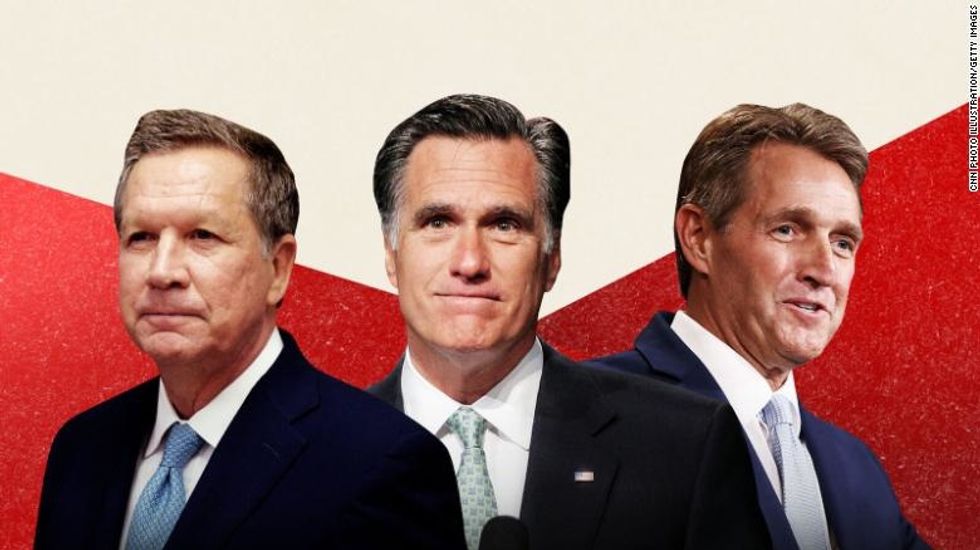Donald Trump is President of the United States. This has been our reality for over two years now, with January 20th having been the anniversary of his inauguration. For all that's happened in this country over the past two years, Trump has been the face of it, both good and bad. As such, much consideration has been made about whether or not he would be a viable candidate for reelection in 2020 after his first term. No matter your political leanings, it's a key question to ask, so let's evaluate the circumstances Mr. Trump may find himself in the coming future.
1. What's in his way of running?

To start, we have to look at whether there are any hurdles that may cause the President to stumble on his way to reelection or even prevent him from running. First off, it's key to note that Trump is not a very popular president. Per Gallup's Presidential Job Approval Center, as of January 10th, the President's approval rating was an abysmal 37%. That's among all Americans, voting or not, Democrat and Republican, rich and poor.
For Democrats, Mr. Trump's approval rating is even worse, sitting at just 6%, while Republicans are significantly more kind to the President, approving of him at a rate of 88%. The key number here, though, is Independents, which make up a vast majority of Americans. From Independents, the President has an approval rating of just 31%, which, for any incumbent, is dangerous, to say the least. The last President to have an approval rating with Independents below Mr. Trump was President Bush, who didn't fall below that mark until after his successful reelection campaign in 2004. The last President to run for reelection with an approval rating from Independents as bad as or worse than Mr. Trump's current rating was President Carter in 1980 when he had a 22% approval rating and subsequently lost reelection.
Poll numbers, though, are only part of the equation when regarding whether or not someone should, or can, run for President. Mr. Trump is currently regarding the latter of those two questions, as the pending Mueller investigation continues to march on, and with recent reports of Mr. Trump's personal lawyer fixing polls for the President during the campaign, as well as reports that the President instructed him to lie under oath to Congress, which the Mueller investigation itself contests, Mr. Trump, as well as many others in Washington DC, are beginning to wonder if impeachment proceedings may be forthcoming.
With the Democrats retaking control in the House of Representatives, where articles of impeachment originate, and many young faces in the party calling for investigations and impeachment itself, it may pose a threat to Mr. Trump's ability to maintain control. Add on top of that the government shutdown that is currently ongoing and, as of writing, has exceeded 30 days, and the growing ill-will among the Republican base and the establishment in Washington towards the President, and Mr. Trump could be facing a bubbling revolution from House and Senate Republicans, many of which have broken from the President over his stances on Russia and the shutdown, so if impeachment does proceed, party loyalty alone may not be enough to save the President.
Obviously, if the President were to be removed from office or were to resign, as many have speculated he may be considering, he cannot run for reelection. However, we cannot dismiss Trump as a candidate until the aforementioned theories come to fruition. Therefore, assuming he won't be impeached and he won't resign, we must move on to more pressing matters.
2. Who would run against him?

Really, the question should be, "Who would dare run against him?" For much of the history of party politics in America, party loyalty is far more important than party favorability. Take, for example, the 1912 Republican Presidential Primary. After having served as President from 1901 to 1909, Theodore Roosevelt retired and endorsed his then-Vice President, William Howard Taft, for the Republican nomination. However, following his successor's first term, Roosevelt felt disappointed in his prodigy's reign and decided he did not want Taft to remain President or leader of the Republican Party. As such, in 1912, he ran to unseat his successor and win a third term as President.
Many party loyalists were angered by Roosevelt's decision, and, despite Roosevelt winning the 1912 Republican primaries, the party still nominated Taft for President, essentially forcing Roosevelt, once the face of the national party, out of it altogether. As you can figure, neither candidate was all too popular, with many Republicans splitting from the party and voting for Roosevelt, who ran under the Progressive Party, while Taft was left with the remaining part of the Republican electorate. As a result, the Democratic candidate in that election, Woodrow Wilson, ended up being elected President.
Many Republican pundits are legitimately concerned that a split electorate, like what we saw in 1912, could effectively scuttle Trump's admittedly-high chance of reelection. In fact, the Republicans and Democrats have been paranoid of this very thing for decades, as both parties have rules that state that if a candidate runs in a party's primaries and loses, he or she cannot split from the party and run as an Independent or for another party. Mr. Trump, then Candidate Trump, actually threatened to do this if he lost the nomination, but that situation never came to be.
With all of that said, it's undeniable that there is a growing part of the Republican Party that is anti-Trump in nature, whether they disagree with him over policy, are wary of his potential allegiances in both the geopolitical and business worlds, or they simply feel that he should not represent the USA or the Republican Party at large. Many of them are names you'd recognize, like Mitt Romney, the former governor of Massachusetts, the Republican presidential candidate in 2012, and now the junior Senator from Utah. You also have former Senator Jeff Flake, who just recently retired from the Senate, former Ohio governor John Kasich, who also ran for the Republican nomination against Trump in 2016, and countless others.
Of the ones most likely to oppose him in a hypothetical 2020 Republican primary season, I'd look out for the likes of Gov. Kasich, Sen. Flake, Sen. Ted Cruz of Texas, another candidate from 2016, or even Evan McMullin, who ran as an Independent against both Trump and Hillary Clinton in the 2016 General Election in an effort to appeal to what he felt was a more moral wing of the Republican Party.
3. So what's the truth?

In actuality, will Trump face any resistance in the lead-up to November 2020? Almost undoubtedly. Will it matter, though? That depends on how things go over the next year. If he fails to end this shutdown that is currently over 30 days long, struggles to reach a satisfying conclusion to the trade war with China, is forced to deal with the potentially-destructive fallout of the Mueller investigation, or something else arises, it's entirely possible that not only will he struggle in 2020, he may not even reach it.
What's my opinion, though? Trump is getting unpopular, losing Republican support, and is starting to feel the heat, but it won't be enough to melt him or his base. As many of you have seen, Trumpers are some of the most devoted fans/followers/supporters of a politician in recent memory, and we've observed that when the President faces the most adversity, it's then that his base comes out the strongest.
In the end, so long as he is still in office by the 2020 primary season, while he'll see a small movement against him in the primary contests, the party and his base will still back him as they have for, at that point, over four years. Does this mean the Democrats will take back the White House in 2020? Will Trump get four more years? We'll all just have to wait and see what lies in store for us between now and then.
















